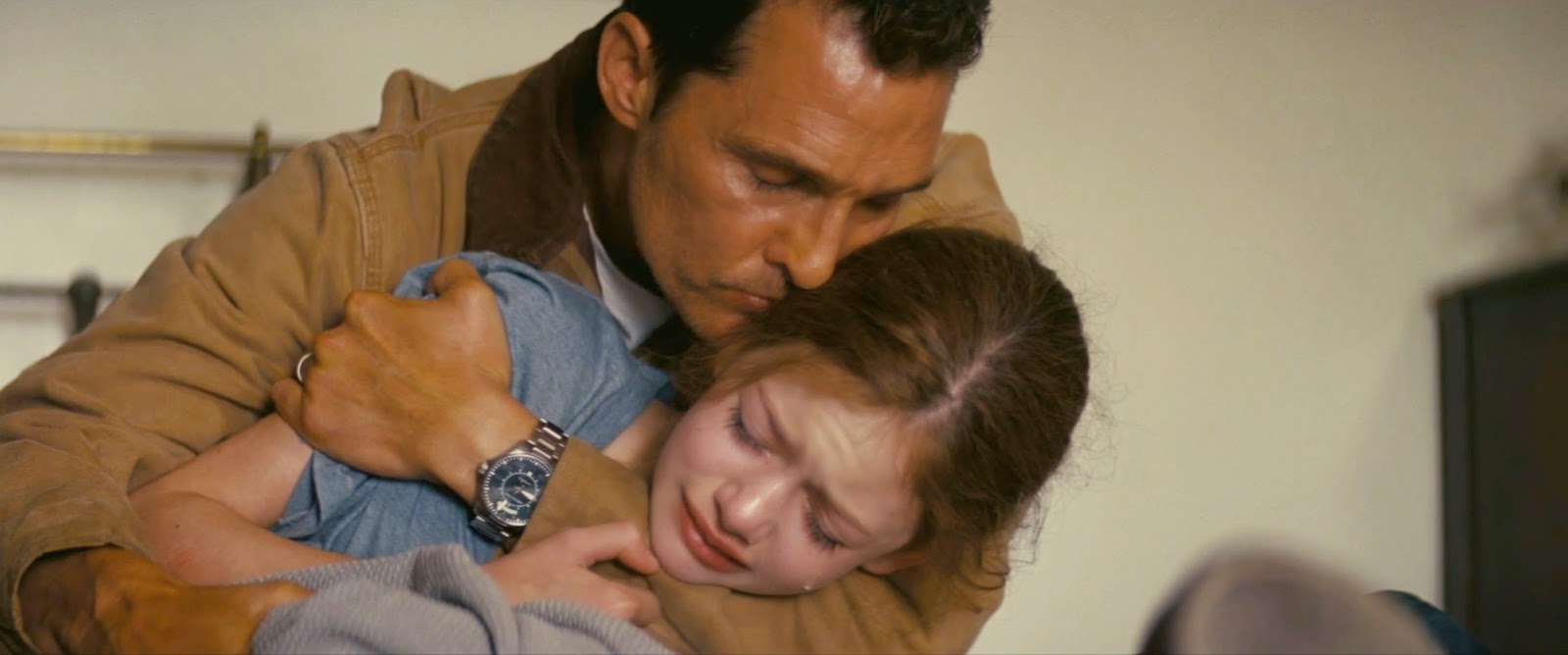Director Christopher Nolan’s latest film, Interstellar, is an original sci-fi story, and at two hours and forty-five minutes, it’s a whopper! In the film, in an undocumented, seemingly near future, dirt and dust have ruined the planet’s food supply and water, leaving all life struggling to survive during harsh dust storms and long droughts. With this inability to sustain humanity, a now-extremely-defunct NASA (even school teachers believe the original 1969 moon landing was a hoax!) approaches Cooper (Matthew McConaughey), a former NASA test pilot and engineer, to pilot a new expedition shuttle with a crew of four to enter a wormhole – located near Saturn – which will lead to another galaxy, and hopefully a new inhabitable world.
The only drawback to Cooper’s mission is having to leave behind his son, Tom (Timothee Chalamet), and daughter, Murphy (Mackenzie Foy), for an indefinite amount of time – if he returns at all. For the sake of his children and the rest of humanity, Cooper embarks on the mission – with his former professor Dr. Brand’s (Michael Caine) daughter, Amelia (Anne Hathaway), geographer Doyle (Wes Bentley), physicist Romilly (David Gyasi) and two robotic assistants, TARS (Bill Irwin) and CASE (Josh Stewart) – to seek out the three possible habitable planets with three different previously-sent astronauts on each.
 |
| Cooper (McConaughey) must say goodbye to his daughter, Murphy (Mackenzie Foy) before embarking on his space mission to another galaxy. |
In a script by Nolan and his brother Jonathan Nolan (The Prestige, The Dark Knight, The Dark Knight Rises), one may think this story is Nolan’s attempt at taking on Stanley Kubrick’s 2001: A Space Odyssey. But they would be wrong. Although Kubrick’s film – based on the 1948 short story The Sentinel by Arthur C. Clarke – is clearly an influence, the story of Interstellar is not quite as divided into parts like 2001. In this film, the human connection is explored with greater story technique than in Kubrick’s film. The story’s overall theme of love and sacrifice packs quite an emotional punch. As a father of two young daughters, to me, the film delivers a heartwrenching decision between seeing the big picture of giving years of your – and your childrens’ – life to save humanity or wanting to be there for your children. It is a dilemma which is brought about with great entertainment value here.
Some may believe the prospect of a situation like the one in Interstellar may be nothing but pure science fiction. However, with news such as the months-long drought in California Hollywood
 |
| The space station containing Cooper and crew begins to enter the wormhole to take them to another galaxy. |
I really enjoyed Interstellar, but that’s not to say it didn’t have its flaws. The film may be a science fiction film, but I love how Nolan made it one of the most believable science fiction films I’ve ever seen. And I’ll stick by that claim – even though the last twenty minutes takes a gigantic leap into extreme science fiction, making the viewer question whether what happens could really happen. But that is the beauty of science fiction. It tests our thinking, our emotional and logistical/mental understanding and allows us to “think outside the box” (so to speak) when it comes to our lives and our place in the universe. Some may be turned off by the last 20 minutes of this film, and I originally did not know quite what to make of it at the time, but, after having time to have digested the material, I liked most of it. There was only one particular aspect at the end which I didn’t agree with – as a parent. But I cannot say it without giving away one of the film’s major plotlines. Yes, Interstellar is long – at 2 hours, 45 minutes, but with films like Cloud Atlas, Braveheart, and Saving Private Ryan, a long run-time is not such a bad thing. And it’s not nearly as trite as films like Armageddon (don’t get me wrong, I like that film), Deep Impact, Mission to Mars, or Red Planet. But, while some critics may think it too emotional, I believe that is one of its best features. If you’re looking for some run-of-the-mill action/romance blockbuster, go rent Transformers 4. With its smart science speak, emotional depth and superb performances, Interstellar is a must-see for any science fiction fan. I think it leaves last year’s Academy Award darling Gravity in the dust. In an age of non-original films based on books, video games, comic books, cartoons, true stories or remakes of older films, Interstellar proves the paramount filmmaking of legendary directors such as Spielberg, Coppola, Lucas, Scorsese, and, yes, Kubrick, lives on in the filmmakers of today.

